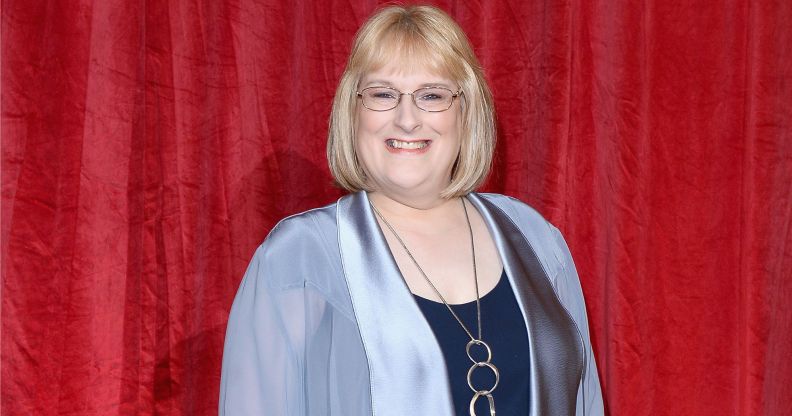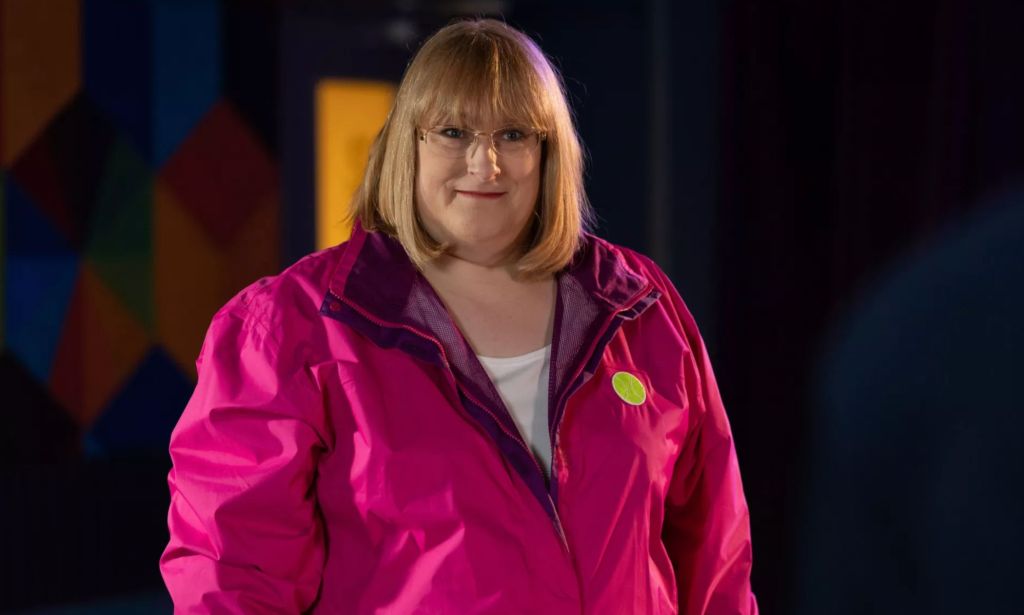Hollyoaks star Annie Wallace expertly breaks down why so-called ‘trans ideology’ doesn’t exist

Hollyoaks legend Annie Wallace. (Getty/Jeff Spicer)
Hollyoaks actress Annie Wallace has dismantled the concept of so-called ‘trans ideology’ with just two tweets.
Scottish actress Annie Wallace, 58, became a firm favourite on the Channel 4 soap when she arrived in the fictional Cheshire village of Hollyoaks as Sally St. Claire back in 2015, becoming the first trans actress to portray a trans woman on a British soap.
In the years since, her character Sally, who plays a headteacher, has contended with the horrors of transphobia on screen. When she first arrived, she was outed by student Peri Lomax (Ruby O’Donnell) to the rest of school, with Peri painting a transphobic slur on a school art exhibition that Sally was about to unveil.
Then, in 2021, she suffered a transphobic attack while in prison, in a storyline highlighting the rising amount of anti-trans hate crime in the UK.
Away from Hollyoaks, Wallace – who became the first trans actress to ever be nominated for a BAFTA in 2016 – has also sadly become accustomed to dealing with transphobia in the real world.
She’s had to deal with the frequent waves of hatred that come with being a trans person on social media, and in 2022 got into a very public Twitter row with former Hollyoaks castmate Joe McGann over his views on trans issues.
Despite the bigotry, Wallace has managed to find the willpower to support her trans siblings as a patron of trans charity Mermaids and to tackle transphobia head on.
In her most recent example of dismantling anti-trans myths frequently paraded on social media, Wallace has cleanly and concisely laid out why so-called ‘trans ideology’ does not exist.
Over the weekend (9 July), a tweet went viral after suggesting that trans people didn’t exist twenty years ago. The tweet and the account that published it have since been deleted.
Referencing the post yesterday (11 July), Wallace tweeted: “OK, so firstly, there is no such thing as trans ideology.”
The term “trans ideology” is often used to vilify and undermine the validity of trans and gender non-conforming people by suggesting the community is something of a new phenomenon being forced on younger generations.
“Secondly, I transitioned 34 years ago,” Wallace continued. “I can assure you [there] were lots of trans people around at the time, but we hid, because at the time we had no rights.
“Trans people don’t hide as much these days, because we have legal protections, and nor should we anyway. The ‘fad’ is the pathetic [gender critical] hostility we have seen for the past seven years. Febrile and poisonous,” she added.
Wallace has previously shared that she transitioned at the age of 24, back in 1989.

Trans people have only been fully legalised recognised in the UK for less than 20 years, following the passing of the Gender Recognition Act 2004. Meanwhile, trans people have only been legally protected from discrimination – on the basis of gender reassignment as a protected characteristic – since the passing of the Equality Act 2010.
In addition to the introduction of laws intended to protect trans people, trans visibility has sky-rocketed in the media and entertainment industry in recent years – with Wallace’s character as a prime example.
LGBTQ+ stars have frequently expressed how accurate queer media representation enables others to feel seen, and able to come out themselves.
Meanwhile, scientific studies have debunked the myth that being trans is a social contagion sweeping through the younger generations.
In response to Wallace’s tweet, which has now been seen more than 100,000 times, other people have shared their disbelief at the myth that trans people are a new concept.
“My first introduction to the existence of trans women was a tv show about ‘sex-swaps’ from the 1980s. My introduction to the existence of trans men was from a friends magazine from about 1994,” one person wrote. “People who can do maths can work out that that is more than 20 years ago”.
“I became a trans ally when I found out about Wendy Carlos,” wrote another person, referring to the American musician who transitioned in the ‘60s. Carlos became the first trans woman to win a Grammy Award back in 1970.
“Trans people have existed for as long as modern humans have existed,” wrote another person, summarising Wallace’s point. “Some cultures have accepted this, but most have made it difficult to be open.
“There aren’t more trans people now, just more visibility.”

